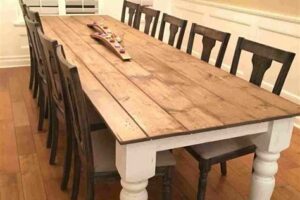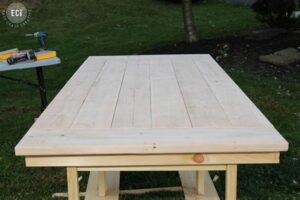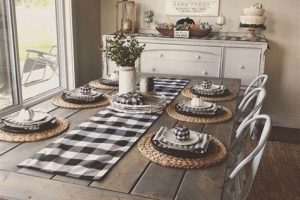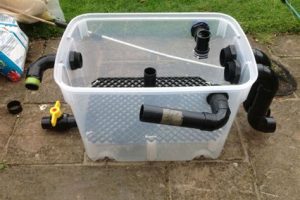Discover the world of DIY farm implements and take control of your farming needs. From building your own tractor attachments to constructing equipment for livestock management, explore a range of practical and cost-effective solutions. Unleash your creativity and efficiency with DIY farm implements that are tailored to suit your specific requirements.
When it comes to farming, having the right tools and equipment can make all the difference in the world. Whether you are a professional farmer or someone who enjoys gardening as a hobby, DIY farm implements can be incredibly useful. Not only do they provide cost-effective solutions, but they also allow you to customize and tailor your tools to fit your specific needs. From homemade seed planters to improvised irrigation systems, these innovative implements can help maximize efficiency and productivity on your farm. In this article, we will explore some of the most practical and ingenious DIY farm implements that will catch your attention and inspire you to take your farming game to the next level.
Introduction
When it comes to farming, having the right tools and implements can make all the difference in efficiency and productivity. While professional farm equipment may be expensive, there are various do-it-yourself (DIY) solutions that can be just as effective. In this article, we will explore some DIY farm implements that you can create on your own, saving you money while still getting the job done.
The Benefits of DIY Farm Implements
Using DIY farm implements has several advantages. Firstly, it allows you to customize the equipment to fit your specific needs and requirements. Secondly, it can significantly reduce the cost of purchasing brand-new machinery. Finally, it gives you a sense of satisfaction and pride in creating something practical with your own hands.
Plow Attachment for a Lawn Tractor
A plow attachment for a lawn tractor is a useful implement for small-scale farming or gardening. By attaching a plow blade to the front of your lawn tractor, you can easily turn over soil or clear light snow. Simply modify a standard plow blade to fit your tractor and attach it securely. This DIY solution can save you money compared to investing in a specialized plow tractor.
Chicken Coop
Building a chicken coop is an essential project for any aspiring farmer or homesteader. Chickens provide a sustainable source of eggs and meat, and having a well-designed coop is crucial for their health and safety. There are numerous DIY plans available online, allowing you to construct a chicken coop that suits your available space and the number of chickens you plan to keep.
Seed Spreader
When it comes to planting seeds, a seed spreader can save you time and ensure even distribution. Creating a DIY seed spreader is relatively simple. You can repurpose a large plastic container with a lid, such as an old detergent bottle, by drilling holes in the bottom. Fill it with seeds, screw on the lid, and shake the container gently to spread the seeds over your desired area.
Compost Bin
Composting is a fantastic way to turn kitchen scraps and yard waste into nutrient-rich soil for your garden. Constructing a DIY compost bin is straightforward and cost-effective. Using wooden pallets, wire mesh, or even repurposed barrels, you can create a structure that allows air circulation while containing the compost pile. This will help speed up decomposition and provide you with quality organic fertilizer.
Hay Bale Trailer
A hay bale trailer is an essential tool for transporting and storing hay bales. By repurposing an old flatbed trailer and adding sturdy sides and a ramp, you can easily load, transport, and unload hay bales without the need for expensive specialized equipment. This DIY solution not only saves you money but also allows for easy customization based on the size and weight of your hay bales.
Raised Garden Beds
Raised garden beds offer many benefits, including improved soil drainage, better weed control, and easier access for planting and harvesting. Building your own raised garden beds is a cost-effective alternative to purchasing pre-made ones. Use untreated lumber or repurposed materials like bricks or cinder blocks to create the desired shape and size for your garden.
Watering System
Efficiently watering your crops is crucial for their growth and productivity. Creating a DIY watering system can save you time and ensure proper irrigation. One simple method involves using PVC pipes with strategically placed holes to distribute water evenly along rows of plants. You can connect these pipes to a water source and control the flow using valves and timers.
Portable Livestock Shelter
A portable livestock shelter is an excellent option for farmers who need to provide temporary or movable housing for their animals. Using sturdy materials such as PVC, plywood, and tarp, you can construct a lightweight and portable shelter that offers protection from the elements. This DIY solution allows you to easily relocate the shelter when needed, ensuring the health and safety of your livestock.
Windmill Water Pump
For farmers in areas with limited access to electricity, a windmill water pump can be a valuable asset. Constructing your own windmill using metal or wooden components allows you to harness the power of wind to pump water for irrigation or livestock needs. While building a windmill requires some technical knowledge, the end result can provide a sustainable and cost-effective water solution.
Conclusion
DIY farm implements can be a game-changer for farmers looking to save money and create customized solutions for their operations. Whether it’s a plow attachment for a lawn tractor, a chicken coop, or a compost bin, there are countless possibilities for creating your own practical farm equipment. Remember to prioritize safety and research proper construction techniques before starting any DIY project. With a little creativity and effort, you can enhance your farming experience while staying within budget.
Introduction to DIY Farm Implements
DIY farm implements are tools and equipment that farmers can make themselves to aid in their agricultural practices. These implements are designed to enhance efficiency, reduce costs, and provide customized solutions for specific farming needs. Skilled farmers who have knowledge of DIY techniques can save money by crafting their own tools and adapting them to suit their individual requirements.
Benefits of DIY Farm Implements
Building your own farm implements offers several benefits. Firstly, it allows for customization, enabling farmers to create tools that precisely meet their needs and preferences. Secondly, DIY implements help farmers save money since they can be made using affordable or recycled materials, reducing the expenses associated with purchasing pre-made equipment. Finally, farmers have better control over the quality and functionality of their tools, as they are involved in the construction process from design to completion.
Essential Tools for DIY Farm Implement Construction
To successfully build DIY farm implements, essential tools such as welding machines, saws, drills, and measuring equipment are required. These tools allow farmers to cut, shape, and join materials effectively, ensuring the durability and functionality of their homemade implements. Having access to the necessary tools is crucial for DIY enthusiasts to bring their innovative ideas to life and construct practical farm implements.
DIY Farm Implements for Soil Preparation
Homemade soil preparation implements include plows, harrows, and cultivators that can be constructed using scrap metal, wood, and basic welding techniques. DIY plows help break and turn the soil, preparing it for planting, while homemade harrows and cultivators assist in leveling the soil and removing weeds. Constructing these tools not only reduces costs but also allows farmers to customize their size, shape, and design according to the unique needs of their land.
DIY Farm Implements for Irrigation
Irrigation is a critical aspect of farming, and DIY implements like drip irrigation systems, sprinklers, and water tanks can be easily constructed using readily available materials. Farmers can build their own drip irrigation systems using PVC pipes and timers, saving water and ensuring precise watering for their crops. DIY sprinklers can be made from plastic bottles or cans, providing an economical alternative to store-bought options.
DIY Farm Implements for Crop Protection
Building DIY implements for crop protection is essential for guarding against pests and diseases. Homemade solutions like scarecrows, bird deterrents, and row covers can be easily constructed using inexpensive materials. Farmers can create their own scarecrows using old clothes or materials like straw, discouraging birds and other pests that may damage crops. DIY row covers made from lightweight fabric protect plants from frost, insects, and excessive sunlight, promoting healthier growth and reducing chemical interventions.
DIY Farm Implements for Harvesting
Homemade harvest tools, such as fruit pickers, nut gatherers, and potato diggers, can be constructed to save time and reduce physical strain during harvesting. DIY fruit pickers can be made using PVC pipes and baskets, allowing farmers to reach high branches conveniently and efficiently gather their fruit. Homemade nut gatherers consist of wire cages or baskets on rolling wheels, making it easier to collect fallen nuts without bending or stooping.
Ensuring Safety and Efficiency in DIY Implement Construction
To maintain safety during DIY implement construction, it is essential to follow proper guidelines, wear protective gear, and use appropriate tools and techniques. Farmers should ensure their homemade implements are robust and secure, reducing the risk of accidents or failures during use. Regular maintenance and inspections of DIY farm implements are crucial to ensure their longevity and continued efficiency, allowing farmers to maximize their benefits in the long term.
When it comes to farming, having the right tools and equipment is essential for efficiency and productivity. While there are a wide variety of farm implements available in the market, some farmers prefer to use DIY (Do-It-Yourself) farm implements. These homemade tools are often crafted by farmers themselves using readily available materials. Although DIY farm implements may not have the same level of sophistication as professional-grade equipment, they can still be highly effective and offer several advantages.
Here are some points of view about the use of DIY farm implements:
- Cost-effectiveness: One of the primary reasons farmers choose to use DIY farm implements is their cost-effectiveness. Purchasing professional-grade equipment can be expensive, especially for small-scale or inexperienced farmers. By creating their own implements, farmers can save a significant amount of money while still achieving the desired functionality.
- Customization: DIY farm implements allow farmers to customize the tools according to their specific needs and requirements. Every farm is unique, and certain tasks may require specialized equipment that may not be readily available commercially. With DIY implements, farmers have the flexibility to adapt and modify designs to suit their individual farming operations.
- Local availability of materials: Another advantage of DIY farm implements is the ability to utilize locally available materials. Farmers can repurpose items or utilize scrap materials found on their farms or in their local areas. This not only reduces costs but also promotes sustainability by minimizing waste.
- Quick repairs and modifications: In case of breakdowns or damage to DIY farm implements, farmers can quickly repair or modify them without relying on external support. This ensures minimal downtime and allows farmers to get back to work promptly, reducing the impact on their farming operations.
- Increased self-reliance: Utilizing DIY farm implements promotes self-reliance among farmers. By building their own tools, they gain knowledge and practical skills that can be applied to various aspects of farming. This independence fosters a sense of empowerment and can lead to innovative problem-solving within the farming community.
While there are advantages to using DIY farm implements, it is important to note that they may not always be suitable for all farming operations or tasks. Some highly specialized equipment may require professional-grade tools to ensure efficiency, safety, and long-term durability. Additionally, farmers should always prioritize safety when using any type of farm implement, whether professional or DIY.
In conclusion, the use of DIY farm implements can be a viable option for farmers looking to save costs, customize tools, and increase self-reliance. These homemade implements offer flexibility, quick repairs, and the ability to utilize locally available materials. However, it is essential for farmers to assess the suitability of DIY implements for their specific needs and consider professional-grade equipment when necessary.
Thank you for visiting our blog today. We hope that you have found our article on DIY farm implements informative and helpful. In this closing message, we would like to summarize the key points discussed in the article and provide you with some final thoughts.
Throughout the article, we have highlighted the benefits of creating your own farm implements. By taking a do-it-yourself approach, you not only save money but also have the opportunity to customize the tools according to your specific needs. This can be especially useful for small-scale farmers or hobbyists who may not have access to expensive machinery or specialized equipment.
We have also provided some practical examples of DIY farm implements that you can easily make at home. From simple tools like a seed planter made from PVC pipes to more complex projects like a homemade chicken plucker, there are numerous options available to suit various farming activities. These DIY solutions can help streamline your operations, increase efficiency, and ultimately contribute to the success of your farm.
In conclusion, we encourage you to explore the world of DIY farm implements. Not only can it be a cost-effective alternative to buying pre-made tools, but it can also be a rewarding and empowering experience. By utilizing your creativity and resourcefulness, you can create functional and efficient implements that cater specifically to your farming needs.
Thank you once again for visiting our blog. We hope that this article has inspired you to consider the possibilities of DIY farm implements. We encourage you to continue exploring our blog for more useful tips and information related to farming and agriculture. Have a great day!
.
People Also Ask about DIY Farm Implements:
-
What are some common DIY farm implements?
Some common DIY farm implements include homemade plows, cultivators, seeders, and hay balers. These can be made using readily available materials such as steel pipes, wooden planks, and various mechanical components.
-
Is it cost-effective to build your own farm implements?
Building your own farm implements can be cost-effective if you have the necessary skills, tools, and materials. However, it’s important to consider factors such as time investment, quality of construction, and long-term durability before embarking on a DIY project. In some cases, purchasing pre-made implements may be a more practical option.
-
Where can I find plans or instructions for building DIY farm implements?
You can find plans and instructions for building DIY farm implements from various sources. Online platforms, agricultural forums, and specialized farming publications often offer detailed guides and blueprints for constructing homemade implements. Additionally, local agricultural extension offices or farming communities may provide resources and advice on DIY projects.
-
Are there any safety considerations when building DIY farm implements?
Absolutely. Safety should be a top priority when building and using DIY farm implements. Make sure to follow proper safety procedures, wear appropriate protective gear, and carefully inspect and maintain your homemade equipment. If you’re unsure about certain aspects of construction or operation, consult with experts or experienced farmers to ensure safe implementation.
-
Can DIY farm implements be as effective as commercially available ones?
While DIY farm implements can be effective for certain tasks, they may not always match the performance and efficiency of commercially available ones. Commercial implements undergo rigorous testing, engineering, and quality control processes to ensure optimal functionality. However, with proper planning, construction, and fine-tuning, DIY farm implements can still serve their purpose effectively on a smaller scale or for specific needs.






